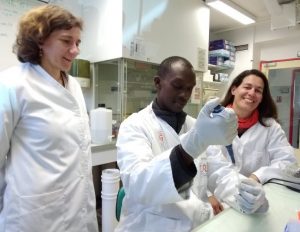Laboratory learning visit funded by CONNECTED
This blog is written by Anthony Mabele, a part-time Tutorial Fellow, part-time Senior Technician and PhD Student in Crop Protection (Molecular Plant Virology) at Masinde Muliro University of Science and Technology (MMUST), Kenya.
He successfully applied for a CONNECTED Training Voucher for a laboratory learning visit to Institut de Recherche pour le Développement (IRD), Montpellier, France. In this article, Anthony summarises thoughts about the experiences gained during the visit and outlines ways in which he is applying new learning…

Anthony Mabele pictured in the lab at Institut de Recherche pour le Développement (IRD) with Agnes Pinel Galzi, Plant Virologist, (left) and Dr Eugenie Hebrard (Head of IPME IRD and Plant Virologist)
Working under the supervision of Dr Eugenie Hebrard, in Unit Interactions Plantes Microorganismes Environnement, my visit to IRD took place from 24 February to 4 March 2020, shortly before the impact of the global pandemic was widely felt.
I was trained in molecular techniques of plant virus diagnostics comprising DAS-ELISA and RT-PCR. My training also included:
- learning laboratory equipment operations
- laboratory management skills
- screenhouse plant inoculations
- ordering of primers
- sending RT-PCR products for Sanger sequencing
- bioinformatic analysis of sequence data, and
- participating in a lab meeting at IRD.
I was also taken to The Cirad Institute, partnering with IRD, to observe screenhouse operations and molecular laboratory establishment, and I established collaboration to compare virus-dependent nucleic acids: Satellite RNAs of Groundnut rosette virus (GRV) and of Tomato yellow leaf curl virus (TYLCV) -alphasatellites and betasatellites.
Using my new skills

Anthony Mabele at Institut de Recherche pour le Développement (IRD)
My future research will be significantly helped by these experiences. The training helped me identify Peanut stripe virus (PStV) which is infecting groundnut/peanut in western Kenya and will be reported as part of my PhD project. This virus been reported in Asia, USA, South Africa and West Africa but not in East Africa where western Kenya belongs, hence making it a new disease report in western Kenya. From a review of the literature, it is reported that PStV is closely related and similar to Bean common mosaic virus (BCMV) in beans.
It helped me know how to execute ELISA and RT-PCR protocols, obtained RT-PCR products and sequence data for Rice yellow mottle virus (RYMV), Groundnut rosette virus (GRV), Groundnut rosette assistor virus (GRAV), Satellite-RNA (Sat-RNA) and Peanut stripe virus (PStV).
The training also enabled me know how to:
- read and interpret ELISA plate results
- analyse bioinformatic sequences, and
- interpret phylogenetic trees.
And it has introduced me to new professional networks both at IRD and Cirad for future collaboration and consultation.
Moreover, to help with my teaching, the training has equipped me with mandatory and necessary information in guiding undergraduate students during molecular biology practical sessions in ELISA, RT-PCR and sequence analysis.
The skills obtained will also benefit postgraduate students and fellow researchers working on plant viruses, in carrying out laboratory diagnostic techniques on their samples and sequence data interpretation.
Training Vouchers are understandably limited in value, to ensure many people can benefit. Ideally, I would have liked the duration of training to have been increased to three weeks so that after obtaining the lab results within the two weeks, a third week could have been dedicated to data analysis and networking.
Nonetheless, I am very grateful to The CONNECTED Network for the opportunity to take part in this important training programme. All worked well for me in terms of travel, accommodation and expenditure.
I sincerely thank The CONNECTED Network team, and Dr. Hebrard, and all at IRD for their excellent supervision, and for purchasing the laboratory reagents, primers, and paying for the sequencing costs of my samples.
